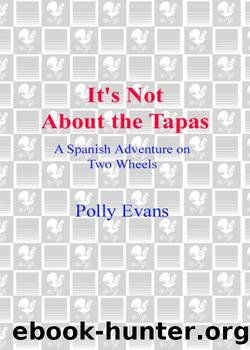It's Not About the Tapas by Polly Evans

Author:Polly Evans
Language: eng
Format: epub
Tags: Fiction
ISBN: 9780307423108
Publisher: Random House Publishing Group
Published: 2007-12-18T00:00:00+00:00
14
Close Encounters with the Tarmac
IF YOUâVE EVER HAD TROUBLE finding your way out of a strange city in a car, you shouldnât try it on a bike. Almost every route is highway, streaming with drivers on a mission to test the shockproof qualities of a cyclistâs helmet. Nobody you ask for directions, of course, has the first idea why you might want to take a bumpy little side road when you could glide along gleaming asphalt instead. They send you straight to the highway. I even tried preselecting candidates for directions by only asking those over seventy years of age. They, at least, I thought, ought to have been around before the highway was built and remember the old road out of town. And perhaps they did. The problem was, most of them had very few teeth and strong Andalusian accents and I couldnât understand a word they said.
After some hours of touring through suburbs and back streets, following signs to nowhere and doubling dizzyingly back on myself again and again, I found myself, thanks to some small miracle, on the road to Fuente Vaqueros, the birthplace of Federico GarcÃa Lorca. Lorca is generally acknowledged as Spainâs greatest twentieth-century poet and playwright. His plays include Blood Wedding; he penned the Gypsy Ballads poems. He might have written a good deal moreââIâm in love with the ones I havenât written yet,â the artist told a journalist who asked him which of his plays he liked the bestâhad the Nationalists not shot him dead in the opening days of the Spanish Civil War. He was just thirty-eight years old.
Lorca stood for everything Francoâs right-wing army was against. He was an intellectual with left-wing inclinations; his name appeared on a 1933 register of the Association of Friends of the Soviet Union. He was homosexual: the firing squad put an extra couple of bullets up his anus to demonstrate their open-mindedness. He spoke out against the conservative values of Granadaâs bourgeoisie.
âIt was a disastrous event, even though they say the opposite in the schools,â Lorca said of the 1492 Reconquest of Granada in an inflammatory interview with El Sol newspaper two months before his death. âAn admirable civilization, and a poetry, architecture and delicacy unique in the worldâall were lost, to give way to an impoverished, cowardly, narrow-minded town, inhabited at present by the worst bourgeoisie in Spain.â
But Lorca was about as apolitical as it was possible for a writer to be amidst the turmoil and uncertainty of 1930s Spain. He repeatedly refused to join the Communist Party; he was concerned with human rights, not political rhetoric. âAs an observer of life, the artist cannot remain insensitive to the social question,â he said. But when asked about his political beliefs, he told a friend, âLook, I greet some people like thisââraising his arm in a Nazi saluteââand others like thisââclenching a communist fist. âBut to my friends, this,â he cried, and held out his hand for his friend to shake. Lorca declared himself too frightened to participate in politics.
Download
This site does not store any files on its server. We only index and link to content provided by other sites. Please contact the content providers to delete copyright contents if any and email us, we'll remove relevant links or contents immediately.
| Bike Repair | Excursion Guides |
| Mountain Biking |
Shoe Dog by Phil Knight(5257)
The Rules Do Not Apply by Ariel Levy(4957)
Walking by Henry David Thoreau(3952)
How to Read Water: Clues and Patterns from Puddles to the Sea (Natural Navigation) by Tristan Gooley(3460)
Running Barefoot by Amy Harmon(3445)
I'll Give You the Sun by Jandy Nelson(3428)
Crazy Is My Superpower by A.J. Mendez Brooks(3398)
How to Read Nature by Tristan Gooley(3335)
How Music Works by David Byrne(3259)
The Boy, the Mole, the Fox and the Horse by Charlie Mackesy(3110)
The Fight by Norman Mailer(2927)
Seducing Cinderella by Gina L. Maxwell(2640)
Cuba by Lonely Planet(2629)
Accepted by Pat Patterson(2364)
Going Long by Editors of Runner's World(2356)
The Unfettered Mind: Writings from a Zen Master to a Master Swordsman by Takuan Soho(2305)
Backpacker the Complete Guide to Backpacking by Backpacker Magazine(2241)
The Happy Runner by David Roche(2233)
Trail Magic by Trevelyan Quest Edwards & Hazel Edwards(2177)
